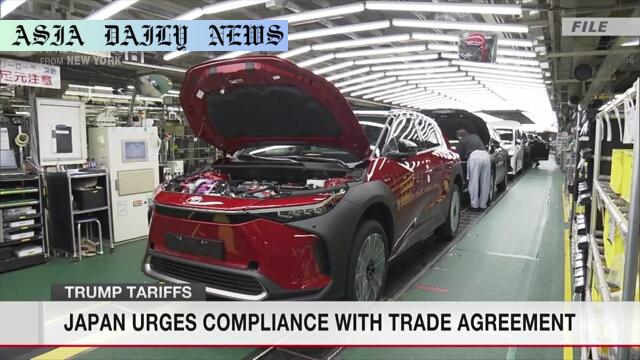Tariffs – Japan calls for US compliance on trade agreements amidst new tariff hikes affecting automobiles and auto parts.
Japan urges the US to comply with a recent trade agreement addressing automobile tariffs.
President Trump’s new tariff rates add tension to the agreement signed last week.
Japan emphasizes timely reductions in levies to meet agreed terms.
US signals potential review and adjustments if terms are unsatisfactory.

Introduction to the Tariffs and Their Implications
The trade dynamics between Japan and the United States have entered a critical juncture following the announcement by US President Donald Trump regarding new tariff rates. Effective August 7, these tariffs include a baseline levy of 15 percent on imports from Japan, a figure that aligns with the deal both nations recently discussed. However, ambiguity around automobile and auto part levies has created significant uncertainty and prompted urgent action from Japan. Prime Minister Ishiba Shigeru has strongly urged the US to honor the commitments outlined in their trade deal, emphasizing swift compliance and clear communication regarding tariff policies.
The US Executive Order and Its Impact
President Trump’s executive order, signed recently, impacts dozens of nations, including Japan, with an elevated baseline levy for imports. The administration’s decision to institute these changes might appear consistent with last week’s negotiated 15 percent tariff for automobiles. However, Japanese officials have expressed concern due to the lack of explicit confirmation within the order regarding auto-related tariffs. This discrepancy not only undermines the trust in bilateral agreements but also raises questions about the future stability of US-Japan trade relations.
Japan’s Strong Response and Call for Action
Japan’s government, led by Prime Minister Ishiba, has taken an assertive stance in response to the new developments. Stressing the importance of honoring trade agreements, Japan seeks an immediate resolution that includes specific measures to lower levies on automobiles and other industries affected by the policy shifts. The ambiguity surrounding automobile tariffs directly conflicts with expectations set during the negotiations, necessitating urgent intervention from both administrative and diplomatic channels to stabilize trade relations.
Implications for US-Japan Relations
The recent developments in trade tariff policies have significant implications for the relationship between the United States and Japan. While the Trump administration emphasizes its commitment to protecting domestic industries, the unilateral adjustments to tariffs, particularly on key imports such as automobiles, raise questions about consistent and fair trade practices. Treasury Secretary Scott Bessent’s remarks regarding quarterly reviews of the agreement, coupled with warnings of reintroducing a 25 percent tariff, further complicate matters. These policy ambiguities could potentially disrupt confidence at a time when both nations are seeking to strengthen economic ties.
Broader Global Trade Implications
The escalation in US-Japan trade tensions also serves as a microcosm of broader global trade challenges. Given the interconnected nature of global supply chains, changes in one country’s tariff policies often ripple across multiple economies. The United States’ approach underlines the importance of clear, consistent agreements to prevent potential fallout in trade relationships. As nations navigate economic recovery post-COVID-19, clarity and cooperation in trade agreements will be more important than ever to ensure stability and mutual growth.
The Path Forward for Trade Stability
Resolving the current tariff tensions between the US and Japan requires diplomatic engagement, thorough communication, and adherence to mutual agreements. Both nations stand to gain significantly from a stable and transparent trade pact, particularly as industries such as automobiles represent critical economic sectors for each. Resolving this issue swiftly will not only restore confidence in their bilateral relations but also provide a blueprint for handling future trade negotiations in an increasingly complex global environment.



Commentary
Understanding the Significance of the US-Japan Trade Deal
The recent tension in US-Japan trade relations sheds light on the complexities of modern economic agreements. Trade pacts, especially among world-leading economies such as the US and Japan, play a pivotal role in shaping global market dynamics. What’s notable is how quickly a situation can escalate when transparency and shared understanding between parties are compromised. The inclusion of specific terms, such as automobile tariffs, in agreements underscores how critical clarity is in securing long-term economic partnerships.
The Need for Confidence and Cooperation
From Japan’s perspective, their call for swift US compliance with the agreed terms is not just about economics—it’s about fostering trust. Agreements of this magnitude are a testament to the collaborative spirit of diplomacy that supports trade and economic growth. Any deviation from such agreements runs the risk of eroding confidence, not just between the US and Japan, but also among other trading partners who rely on consistency in US trade policy.
The Bigger Picture of Global Trade Policies
In a broader sense, the unfolding scenario between the US and Japan highlights a recurring theme: the balancing act between domestic protectionism and global cooperation. While it is understandable for a nation to prioritize its own economic interests, ensuring these actions consider existing global agreements is just as important. Leaders across the world, particularly those spearheading economic recovery in the wake of international disruptions, should prioritize mutually beneficial partnerships to secure lasting prosperity.